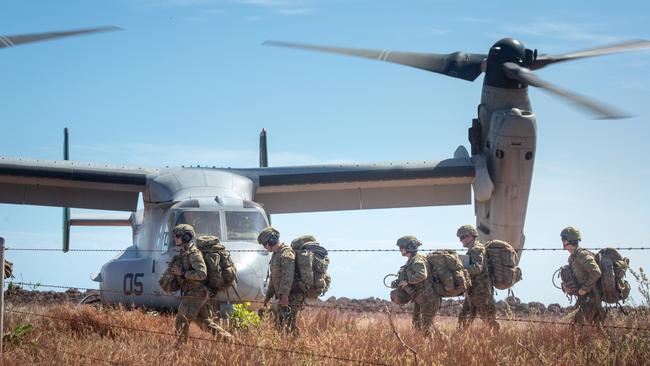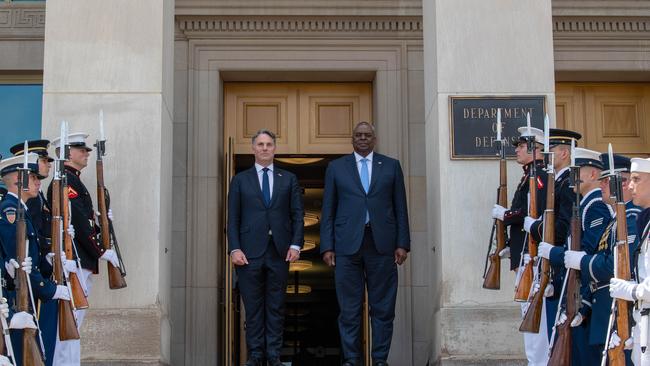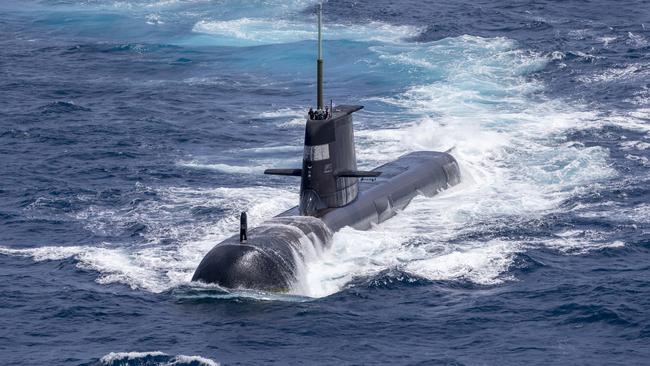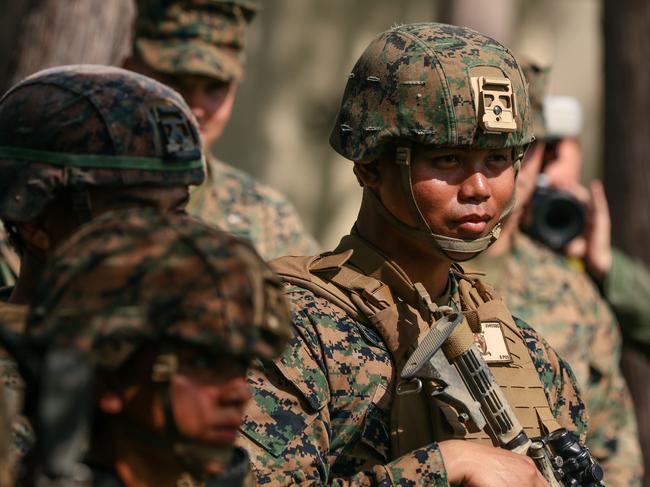US, UK defence chiefs back AUKUS expansion, more security for nuclear submarines in Australia
Australia‘s ‘unbreakable alliance’ with the United States could be strengthened with the deployment of more US military personnel here in addition to securing a nuclear submarine fleet as part of the AUKUS pact.
National
Don't miss out on the headlines from National. Followed categories will be added to My News.
More American troops could soon be deployed down under in the latest move to strengthen the Australia-US alliance.
Up to 2200 US personnel have been involved in this year’s Marine rotation through Darwin, which wraps up this month.
Australian Defence Minister Richard Marles is in Hawaii this weekend for talks with his US counterpart Lloyd Austin and to inspect America’s Virginia-class submarines, as they work to finalise plans for Australia’s nuclear-powered fleet.
The Australian and US leaders are now working on expanding the rotational Marine program.
Speaking after a meeting in Honolulu, Mr Austin said the pair discussed “the great advantage that we enjoy … as a result of those rotations”.
“Certainly we hope to do more in the future, but we don’t have any announcements to make,” he said.
Mr Marles described the Marine rotation as a “very important initiative” and also flagged a willingness to expand it.
“We want to look at other ways we can build upon American force posture and doing that in co-operation with Australia,” the Deputy Prime Minister said.
The plans are expected to advance ahead of the Australia-United States Ministerial Consultation, an annual forum to be held in December.

Mr Austin also hailed the “tremendous progress” made on the AUKUS defence pact while Mr Marles said it was a “very productive conversation”.
He said Australia was on track to announce its “optimal pathway” early next year to acquiring its own nuclear-powered submarine fleet.
Asked when the first nuclear submarine would hit the water, Mr Marles said that was “central to the work that’s underway right now”, and that next year’s announcement would include plans to cover any capability gap between the retirement of Australia’s existing submarines and the delivery of the nuclear-powered fleet.
“We have made the decision to extend the life of the Collins-class submarines, but we need to be thinking about how we acquire a nuclear-powered submarine in a way where we minimise and plug any capability gap that might arise by virtue of that timing,” he said.
“It’s critically important, given the strategic circumstances that we face, that there is an evolving submarine capability in Australia from this day right through to the day where the first nuclear-powered submarine hits the water.”

Both leaders hailed the importance of the “unbreakable alliance” between Australia and the US, particularly in the face of China’s increasing aggression in the Indo-Pacific.
“Today, the region and the world face a growing challenge from autocratic countries attempting to change the status quo through threats, coercion, provocative military activities and even naked aggression,” Mr Austin said.
“We’re deeply concerned by China’s aggressive, escalatory and destabilising military activities in the Taiwan Strait and elsewhere in the region.”

Mr Marles added: “As we watch China seek to shape the world around it in a way we that have not seen before, it presents real challenges for those countries which seek to uphold the global rules-based order.”
Earlier in the week American and British defence chiefs said initiatives like the AUKUS pact could be expanded or replicated with other allies as the only sure way for the West to maintain a technological arms race advantage.
Japanese defence officials are also participating in the talks, fuelling speculation about an expansion of the AUKUS pact.
But they have warned major cybersecurity upgrades will be required to ensure Australia’s acquisition of nuclear submarines – the key plank of the military partnership – is not compromised by foreign spies.
While this is not viewed as an immediate possibility, a top White House official said this week that AUKUS could create a model for sharing defence technology with other countries.
“If we can make this work with our two closest allies ... I think it’s actually a sort of a preview for what may be possible in different and varying degrees into the future,” said Cara Abercrombie, US President Joe Biden’s defence policy co-ordinator.
Speaking at a separate defence forum in the US, British Vice Admiral Martin Connell – the Royal Navy’s second highest-ranking officer – said collaborations like AUKUS were “more important now than they ever have been”.
“The kinds of systems and technologies we’re talking about here are too complex and too expensive for any one nation to be able to try and deal with by themselves, certainly if we’re going to keep the technological edge that the West has had in the past,” he said.
But he cautioned AUKUS would “massively increase our collective threat surface” because of the amount of “very, very sensitive information” which would need to be shared online.
“We really need to take security much more seriously than we do,” Vice Admiral Connell said.
As the AUKUS partners consider whether America could build Australia’s first nuclear-powered submarines to fast-track the rollout, British Navy chief Admiral Ben Key said it was “no surprise” the US and the UK did not currently have that capacity.
“It is difficult to see why we would have had latent submarine building capacity just waiting to see if someone else came along shopping to buy submarines. It’s no surprise that this is putting a little bit of stress on the system,” he said, according to National Defense.
“Let’s not forget what a profound shift (AUKUS) is, and we are working at speed to adapt accordingly.”

In another move to combat China’s influence in the Indo-Pacific, Mr Biden held the first White House gathering for Pacific Island leaders this week, with a sweeping joint declaration signed covering economic, environmental and security issues.
The Solomon Islands had suggested it would not agree to the declaration, having struck a security pact with the Chinese government earlier this year, but a senior Biden administration official confirmed on Saturday that Prime Minister Manasseh Sogavare had signed on.
White House national security adviser Jake Sullivan said the AUKUS agreement was progressing well a year in, and suggested artificial intelligence could become part of the arrangement.
“We’ve made substantial progress on this over the course of the last year. We feel very good on the trilateral co-operation on the submarine program,” he said.
“We think that we have a good path forward. I’m not going to get into specifics on exactly what the nature of the platform will be.
“Our three countries are very much on the same page about the path forward, and there has been significant progress from concept one year ago, to now the process of actually putting this in place.
“We also are pursuing a significant number of advanced capabilities through the AUKUS partnership, in cyber, artificial intelligence, and other areas, we’ve seen significant progress on those as well.
“And there are certain areas where we are looking to bring in other partners as well as part of an open platform approach.”
More Coverage
Originally published as US, UK defence chiefs back AUKUS expansion, more security for nuclear submarines in Australia





